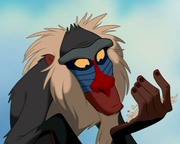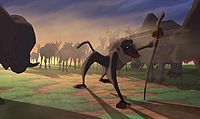Difference between revisions of "Rafiki"
| Line 75: | Line 75: | ||
[[Category:Characters from The Lion King 2: Simba's Pride]] | [[Category:Characters from The Lion King 2: Simba's Pride]] | ||
[[Category:Characters from The Lion King 1½]] | [[Category:Characters from The Lion King 1½]] | ||
| + | [[Category:Characters from The Lion Guard]] | ||
[[Category:Baboons]] | [[Category:Baboons]] | ||
[[Category:Male characters]] | [[Category:Male characters]] | ||
Revision as of 11:13, 7 August 2017
| Rafiki | |
|---|---|
|
Rafiki
| |
| Meaning | Friend, Comrade |
| Species | Mandrill/Baboon |
| Information | |
| Appearances | The Lion King, The Lion King 2: Simba's Pride, The Lion King 1½, The Lion King's Timon & Pumbaa, The Lion Guard: Return of the Roar, The Lion Guard |
| Voice Actor(s) | Robert Guillaume (The Lion King, The Lion King 2: Simba's Pride, The Lion King 1½, The Lion King's Timon & Pumbaa) Khary Payton (The Lion Guard: Return of the Roar and The Lion Guard) Tsidii Le Loka (The Lion King on Broadway Original Cast) |
- "You follow old Rafiki; he knows the way!"
- —Rafiki, talking to Simba
Rafiki is a supporting character in The Lion King franchise. He is a friend and Royal Mjuzi of the royal family of the Pride Lands. He performs activities similar to that of a shaman, such as presenting young cubs atop Pride Rock to the animals, counseling the royal family and keeping in touch with the Great Kings of the Past. He lives in a giant baobab tree in the Pride Lands.
Contents
Physical attributes
Rafiki is a "mutated" mandrill[1] with a long, bent tail, although he is often referred to as a baboon in the movies. He is an old mandrill with a bald head and white hair. His fur is gray and his underbelly is white. Rafiki's is a bit hunched over at some times and at other times he is very limber (as seen when he uses kung-fu on the hyenas at the end of The Lion King). He has two gourds tied to the end of a stick that he takes with him everywhere.
The Lion King
- "Creepy little monkey."
- —Simba
Rafiki's character often serves as the visual narrator of the story of The Lion King. He presents newborn cubs to all the animals gathered at Pride Rock, and draws a stylized lion cub on the walls of his tree house home to represent Simba's birth. When Simba runs away and his family believes him to be dead, Rafiki draws his paw across the Simba drawing, obscuring it in grief. Later, after picking up Simba's scent in the dust and pollen in the air, Rafiki determines that Simba is still alive and restores the drawing, adding the full mane of an adult lion as a sign to seek out this young deliverer from Scar's tyranny.
Journeying to the area where Simba lives with Timon and Pumbaa, Rafiki observes Simba and recognizes, at least in principle, that he is suffering from a ponderous emotional burden. To treat it, he approaches the young lion and teaches him a few playful (and sometimes painful) lessons about learning from the past, not living in it. He also points out that the spirit and values of Simba's dead father, Mufasa, continue to live in Simba himself. During this scene, Rafiki incessantly repeats the Swahili phrase "Asante sana, squash banana, we we nugu, mi mi apana," which roughly translates to "Thank you very much, squash banana, you are a baboon, and I am not." When Simba decides to return to Pride Rock and fight Scar for the kingship, Rafiki accompanies him, demonstrating his kung fu skills in battle against the hyenas. At the end of the film, Rafiki raises Simba and Nala's new-born cub atop Pride Rock for everyone to see, echoing the beginning of the film.
The Lion King II: Simba's Pride
- Kovu: "Who was that?"
Kiara: "Uh, friend of the family." - —Kovu and Kiara, as Rafiki randomly appears in front of Kovu
In the sequel The Lion King II: Simba's Pride, Rafiki appears in the beginning again as the presenter of Simba and Nala's new-born daughter Kiara. Later on in the film, despite protesting that Simba and Zira would forbid it, he is persuaded by Mufasa's spirit to attempt to get Zira's son Kovu (whom Scar chose to succeed him as King) and Kiara to fall in love. He tries to make the adolescent Kiara and Kovu fall in love with each other by taking them to a fantasy paradise called Upendi. Later, when Simba exiles Kovu, he was seen sighing sadly of Kovu leaving. In the end, he acts as the host of Kiara and Kovu's wedding.
The Lion King 1½
Rafiki appears briefly in The Lion King 1½, and is referred to by Timon as "The Omniscient Monkey". It is revealed that it was Rafiki who taught Timon the philosophy of Hakuna Matata. Besides appearing in the scenes he appeared in the original film, Rafiki also appears in a scene where he chats with Timon's mother and in a scene where he makes Timon go back to join his friends against Scar, albeit saying nothing but "My work here is done" after Timon goes to find Pumbaa on his own. A deleted scene from the movie revealed that Rafiki was the movie's original narrator.
The Lion Guard
Rafiki acts as a recurring character in this series (which serves as a midquel to The Lion King II: Simba's Pride).
He first appears in the series' pilot film The Lion Guard: Return of the Roar, where he is seen in his tree as Simba's son Kion and his friend Bunga race past whilst playing Baobab Ball. Rafiki later appears at Pride Rock with Simba and Nala where they hear Kion roaring from afar (as he was saving Bunga from two hyenas named Cheezi and Chungu). Knowing that the roar that Kion did was the Roar of the Elders, Rafiki tells Simba and Nala that Kion is ready to become leader of the Lion Guard (a tradition for all second-born children of the Pride Lands' monarchs). Simba is reluctant to reveal this to Kion as he believes that he is not ready as he is still a cub, but Nala knows that it is time and tells Simba to listen to Rafiki.
Just then Kion and Bunga arrive and are taken to an area of Pride Rock called The Lair of the Lion Guard, where Simba and Rafiki tell Kion about his destiny as leader of the Lion Guard and how the previous leader, Scar lost his Roar of the Elders after he kill the other members of his Guard after they refused to help overthrow Mufasa. Rafiki is later seen in the film with Simba, Nala, Kiara and Tiifu watching Kion, Bunga along with their fellow Lion Guard members Fuli, Beshte and Ono defeating Janja's clan.
In the series, Rafiki is usually seen in the Lair of the Lion Guard painting pictures on the walls (e.g. members of the current and previous Lion Guards and past events, such as Nala's Father being saved by a previous Lion Guard after falling from a tree). Also in the series, Rafiki gains an apprentice named Makini, who will succeed him as Royal Mjuzi by the time Kiara becomes Queen.
The Lion King on Broadway
In the musical based on the film, the character of Rafiki went through a minor change. Because director Julie Taymor felt that the story lacked the presence of a strong female, Rafiki was changed into a female mandrill. The role was originated on Broadway by Tsidii Le Loka, who was nominated for a Tony Award in 1998 for her performance.
Rafiki's role is expanded in the musical. She sings the song Circle of Life and her painting scene is extended. She also sings a song called Rafiki Mourns, in which she mourns Mufasa's death. She also has a brief role in Nala's song Shadowland, blessing Nala for her journey to find help. Instead of finding Simba's scent on dust, Rafiki hears Simba's song on the wind. Rafiki meets Simba and shows him that his father lives on inside him through the song He Lives in You. She is present during the battle, fighting a hyena using hand-to-hand combat. She then appears adorning Simba with the king's mantle and then presents his newborn cub at the end of the play.
Other appearances
- It was revealed in A Tale of Two Brothers that Rafiki was not always a resident of the Pride Lands.
- Rafiki appears in a few episodes of the Timon & Pumbaa TV series and also has his own series of skits called Rafiki Fables in the same show.
- Rafiki is a regular guest at Mickey Mouse's night club in the TV series House of Mouse.
- He appears as a minor non-playable character in the Pride Lands world of the popular Disney/Square Enix video game Kingdom Hearts II.
- Rafiki also appears at the Walt Disney Parks and Resorts as a meet and greet character.
Trivia
- His name means "my friend" in Swahili, a borrowing from Arabic (رفيق, rafīq: friend, companion, or attendant.

